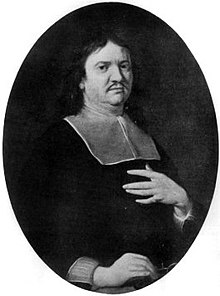Henry Oldenburg
Henry Oldenburg (also: Oldenbourg) (* around 1618 as Heinrich Oldenburg in Bremen ; † September 5, 1677 in Charlton ) was a diplomat and natural philosopher . As the long-time secretary of the Royal Society in London, he was a central figure in the academic world of the 17th century.
biography
Oldenburg was the son of Heinrich Oldenburg, a teacher at the Bremen grammar school illustrious and later a professor at the University of Dorpat . Henry Oldenburg studied theology, went to England and worked as a teacher in noble houses. In 1648 he went on trips through Europe. In 1652 he returned to Bremen and the following year the Senate sent him to England to negotiate with Oliver Cromwell about respect for Bremen's neutrality in the war between England and Holland. Cromwell pledged his support for Bremen's independence from Sweden. Oldenburg made himself known to the most important English philosophers and natural scientists, such as John Milton , Thomas Hobbes and above all Robert Boyle , who appointed him to be his nephew's teacher. Oldenburg traveled through Europe with the young nobleman. He attended the meetings of scientists that Marin Mersenne had founded and was enthusiastic about the “invisible colleges”, but wanted the meetings to be more scientific and less philosophical.
At the beginning of the restoration , the Royal Society was founded on November 28, 1660 . Oldenburg was not present at the founding event, but he was on the first list of members and was appointed Secretary of the Society the following year, at times he held the office together with John Wilkins .
He established an extensive network of scientific contacts throughout Europe and carried out a very extensive correspondence that even extended to the overseas colonies in America. Since he was very good at the baroque phrases and compliments of letter Latin, which in the 17th century were indispensable for correspondence between European scholars, it was easy for him to make new contacts. For medicine in Germany, Oldenburg's correspondence with the editor of the Miscellanea Curiosa , Philipp Jacob Sachs von Lewenhaimb (1627–1672) in Breslau was important. In addition, Oldenburg was editor of the scientific journal Philosophical Transactions . The content of this periodical consisted largely of Oldenburg's correspondence. This encouraged a number of scholars in Europe to write to Oldenburg in the hope of finding a letter published in this famous journal.
In 1667 Oldenburg was imprisoned in the Tower of London for “dangerous endeavors” , due to publications under the pseudonym “ Grubendol ” after 1666.
In 1663 Oldenburg married Dorothy West , who died in 1665. Since 1668 Oldenburg was married to his ward Dora Katherina Dury (1654–77), daughter of the scholar John Dury , in a second marriage ; their children's names were Rupert and Sophia. It was not until 1677, shortly before his death, that Oldenburg acquired English citizenship.
Important correspondents
Ehrenfried Walther von Tschirnhaus in Dresden , Antoni van Leeuwenhoek in Delft , Baruch Spinoza and Jan Swammerdam in Amsterdam , Christiaan Huygens in The Hague , Melchisédech Thévenot in Paris , Christopher Wren , Edmond Halley and Robert Boyle in Oxford , Johannes Hevelius in Gdansk , Philipp Jakob Sachs from Lewenhaimb in Breslau .
literature
- Henry Oldenburg: The Correspondence of Henry Oldenburg. Edited and translated by A. Rupert Hall and Marie Boas Hall . 13 volumes. University of Wisconsin Press et al., Madison WI et al. 1965-1986.
- Marie Boas Hall: Henry Oldenburg. Shaping the Royal Society. Oxford University Press, New York NY et al. 2002, ISBN 0-19-851053-5
- Douglas McKie: The Arrest and Imprisonment of Henry Oldenburg. In: Notes and Records of the Royal Society of London. 6, 1, Dec. 1948, ISSN 0035-9149 , pp. 28-47.
- Thomas Elsmann: In the shadow of the merchant - Bremen scholars 1600–1900 . Bremen: Schünemann 2012, pp. 80–99
- RK Bluhm: Henry Oldenburg, FRS (c. 1615–1677). In: Notes and Records of the Royal Society of London. 15, 1960, pp. 183-197.
- Iordan Avramov: Letters and questionnaires: the correspondence of Henry Oldenburg and the early Royal Society of London's Inquiries for Natural History . In: Paula Findlen (Ed.): Empires of knowledge - scientific networks in the early modern world. London-New York: Routledge 2019. ISBN 978-1-138-20712-7 , pp. 161-180.
- Neal Stephenson : Baroque Trilogy ; here he plays an important role.
Individual evidence
- ^ History of the Royal Society , accessed February 23, 2018.
- ↑ a b c Ralph Bröer: Cross-border scientific discourse in Europe in the early modern period. The learned letter in the 17th century. In: Wolfgang U. Eckart and Robert Jütte (Hrsg.): The European health system. Similarities and differences from a historical perspective. Franz Steiner Stuttgart 1994, ISBN 978-3-515-06485-9 , p. 111 f.
- ↑ http://www.answers.com/topic/henry-oldenburg , link broken on February 23, 2018.
Web links
- Entry to Oldenburg; Henry (c 1617-1677) in the Royal Society Archives , London
| personal data | |
|---|---|
| SURNAME | Oldenburg, Henry |
| ALTERNATIVE NAMES | Oldenburg, Heinrich (maiden name) |
| BRIEF DESCRIPTION | Diplomat and natural philosopher |
| DATE OF BIRTH | around 1618 |
| PLACE OF BIRTH | Bremen |
| DATE OF DEATH | September 5, 1677 |
| Place of death | Charlton |
